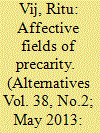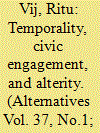| Srl | Item |
| 1 |
ID:
121198


|
|
|
|
|
| Publication |
2013.
|
| Summary/Abstract |
This article explores the affective structure of precarity and its gendered antinomies. Building on feminist critical engagements that call attention to the elision of reproductive and household labor in emergent theorizations of precarity, it draws on Lauren Berlant's work on affective attachments to offer a reading of cinematic narratives of precarity in contemporary Japan, a space only tangentially referenced in a largely Euro-American discourse on precarity. Delineating precarity as an affective field of intelligibility, both inimical to yet potentially enabling of a feminist opening, this article offers an analysis of two films: Japan a Story of Love and Hate shows how the affective normalization of women's precarity privileges the affect of loss for men in precarity, suggesting it is the loss of mastery entailed by the movement of men from once secure to insecure work that mobilizes an affective-political turn under the sign of precarity; in contrast, a reading of Tokyo Sonata as an allegorical treatment of precarity shows how the feminization of men wrought within precarity can open up the possibility for a normative rupture of prevalent gendered hierarchies.
|
|
|
|
|
|
|
|
|
|
|
|
|
|
|
|
| 2 |
ID:
112752


|
|
|
|
|
| Publication |
2012.
|
| Summary/Abstract |
Recent studies of civic engagement with ethnic others have attempted to rethink the ground of liberal multiculturalism by locating the migrant in coeval, not differential, time. Based on an ethnographic study of subcontinental migrants (Indo-kei) in contemporary Japan, this article draws attention to the limits of claims of coevalness, specifically its inadvertent reinscription of identitarian thought. Drawing on Kojin Karatani's notion of the "borromean rings" of capital-nation-state, and the multiple times associated with each, the article tracks the figure of the Indo-kei within a fluid terrain of social relationality through the varied sites and spaces of capital, nation and state in twenty-first-century Japan. This enables a more nuanced understanding of the borders/lines/distinctions that shape the migrant's journey through multiple zones of civic engagement/disengagement in different locales.
|
|
|
|
|
|
|
|
|
|
|
|
|
|
|
|